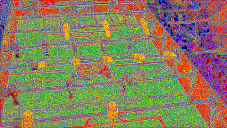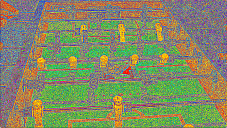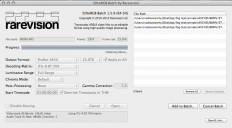
-
@itimjim Try 5DtoRGB free version. See if you like it or not. I like it.
-
@stonebat I think folk aren't understanding where I'm coming from. I'm a fully paid up owner of the batch version on Mac.
But, if I can be certain it doesn't provide me with any benefit in quality with my workflow, then I'm happy to drop it, as it does add a fair bit of time to the process. I've been happy with it so far to be honest, but I've not had chance to be very critical of what it provides me.
@onionbrain indicated that in a PP/AE workflow it was a waste. But @bwhitz has posted some edge samples on blue backgrounds in another post that did seem to highlight better chroma rendition. His advice was that it might not be necessary all the time, but would be useful for chroma key.
As you can see its a bit confusing, and yes I should rely on my own tests and experience (which is limited compared to a lot of members on here), but when an experienced poster states that it's a big April fools joke, it makes me question my workflow...naturally.
Any advice and help, much appreciated as usual.
-
Here's a good example of some stuff I just shot with Sedna max detail and converted to Prores422HQ.
Native footage:

5DtoRGB:

Premire:

So yea, 5DtoRGB takes the longest... but it's definitely worth it, IMO. This should also confirm that the chroma reconstruction is real... and not just marketing. It really is happening.

 Native.jpg531 x 316 - 179K
Native.jpg531 x 316 - 179K
 5DtoRGB.jpg460 x 305 - 131K
5DtoRGB.jpg460 x 305 - 131K
 Premire.jpg529 x 307 - 187K
Premire.jpg529 x 307 - 187K -
I went ahead and took two screen shots straight out of after effects CS5. Saturation 100, sharpness 1000 so that you can clearly see how macroblocks make up the image. Both images are from the same clip just a little bit off in the timeline. The first is the .mts file imported directly into After effects. The second clip is transcoded through 5dtoRGB to Prores444 and then imported into after effects.
The 5DtoRGB transcode is more uniform and the blocking is smaller, areas of smaller blocks won't fall apart as fast as groups of larger blocks in the color correction process.

 mts.png962 x 543 - 434K
mts.png962 x 543 - 434K
 4444.png963 x 542 - 379K
4444.png963 x 542 - 379K -
@bwhitz I hope you don't mind but I brought both your GH2 MTS raw and the Prores422HQ image and compared them next to each other at 300%.
It's certainly obvious how well the chroma smoothing has helped the blocking. The Prores422HQ image is on left. (of course..hehe)

 Prores422HQ MTSRAW.png1588 x 837 - 2M
Prores422HQ MTSRAW.png1588 x 837 - 2M -
Could one of you guys using a mac please do a similar test on the output from 5DtoRGB with the DNxHD codec ? Caveat : I'd like to see the output a la bhwitzs framegrabs, not the block sizes a la reckless framegrabs.
-
@bwhitz: Can you share that worst case scenario MTS file? I would like to see how fares in a full After Effects CS5.5 workflow!
Thanks!
-
@proaudio4 "I hope you don't mind but I brought both your GH2 MTS raw and the Prores422HQ image and compared them next to each other at 300%."
No not at all... looks great! Nice!
-
is it necessary to convert into prores 422 hq??? what about just standard prores 422,.. 5dtorpg is it a very good solution for this conversion??
-
@rajamalik looking at the datarates of Prores if its footage from a gop1 setting (like Sedna AQ1) I'd definitely go for 422HQ. But why not just try both options and compare the results yourself ?
-
@rajamalik I personally use ProRes 444
-
-
@rajamalik So far, no one has demonstrated a converter superior to 5DtoRGB in context of preparing files for FCP. The only arguments have been about whether other approaches (like Cineform) are comparable or not, and whether 5DtoRGB makes sense for Adobe and Sony applications.
In other words, if you are working in FCP, then 5DtoRGB currently appears to be either the best or at worst, one of the best options. I would not spend more money - I do not believe it will get you a better result in this case.
If you needed to go back and forth between Premiere and Vegas, then I might use Cineform .AVI to convert the output from FCP (because Vegas does not support ProRes output and performs more slowly with .MOV files). But 5DtoRGB would be the first thing I would try if I was just working with FCP.
-
@shian Before grading with Color GHear in AE, if I look at the mts files with Qtime or simply hitting the space bar (I am on a mac, of course), they look identical to the files converted with Finalcut X. Instead, if I convert them with 5torgb, even if I use the settings you suggested (444 prores, no gamma, 709), I get files very different from the original: the dark part rises, and the overall image seems a little less sharp, or may be it is just the distribution of light and dark across the frame. Could you please explain me this?
-
I'll try to make a video and explain everything once and for all today. Too much confusion, varying gamma settings on players vs NLEs and converters vs grading platforms.
In my personal and professional opinion 5DtoRGB is the best option for converting mts to a more robust and stable codec for post production needs. I use it. I endorse it. I don't get paid for my endorsement. (I wish I did). It does come at a cost ($50 for the program, and the need for more storage space) but quality usually comes at a higher cost. In this case it's not a massive hit, and the cost/benefit factor is in your favor.
Video to come later today to show as many of the common options, what they look like, how they withstand extreme grading, and then you can decide for yourself.
-
@shian thanks for your efforts. Curious if you leave gamma setting to 1.0 and luminance to broadcast or full range?
-
Interesting you use Full Range. I use it as well but I notice it 'lifts' the blacks over the broadcast range. For certain shoots I'd go with broadcast though
-
Ok. the video is about 27 minutes long, not my best work in terms of getting to the meat of it quickly, as this was done on the fly without rehearsing it ahead of time so that my findings would be unbiased, as a result the video drags a bit, but everything here was done honestly, and even surprises me in couple of places. I chopped the beginning where I described what the test consisted of, which follows --
I encoded the following:
In FCP
422
422HQ
In 5DtoRGB
422 Broadcast
422 Full
422HQ Broadcast
422HQ Full
444 Broadcast
444 Full
and then compared all of them to the RAW mts file.
The findings in brief:
- MTS sucks
- No need to go 444, so save yourself some drive space.
- Broadcast luma sucks. Encode using full range luminance. (EDIT: Broadcast doesn't suck. I actually prefer it now for less luma compression.)
- Not a TON of difference between FCP and 5DtoRGB except, there's less Chroma smearing in Full Range Luminance encodes which grade MUCH better all around even in terms of how they retain chroma and luma values.
- Again, MTS files jagged edges all over the place, even on skin tones.
Play by play - At first, we don't notice much difference between MTS and the various encodes, as I dig deeper we begin to see that there is indeed an advantage to using ProRes encodes over raw MTS, and then we see there's advantages to using Full Range Luma over Broadcast Luma, and thereby an advantage to using 5DtoRGB over FCP which only delivers Broadcast Luma encodes.
Final verdict - not much of a gain over FCP7 prores encodes, except for full range option. But big advantage over AVC1 FCP X encodes. Big advantage over using raw MTS. With FCP X, sometimes hacked footage cannot be read by "import from camera" 5DtoRGB will save your ass when that happens.
video password: 5DtoRGBShot with Quantum v9b
-
5D is better, how about looking at each channel is blue a bit better? how important is broadcast range? i mean if you send your footage to a tv station for some reason they wont play it if its not broadcast range?
-
@sebasp1 I wouldn't worry about it. Every video program on the planet has a drag and drop broadcast safe plugin to conform your footage to within tolerances. but yes... It has to be within your region's tolerances in order to be broadcast on TV.
-
Having a larger range as input for your grading is perfect – any grading solution will allow you to get it back into legal range but with YOUR aesthetic choices, not the computers ones.
-
@shian very good test thx for that. I also had noticed that there wasn't too much difference between 444 & 422(HQ) that's why i used 422(HQ). Now i am also surprised to see that there isn't too much difference between fcpx(did u use fcpx or fcp?) import and 5DtoRGB besides the full range thing because before u said that fcp import is not good and fcpx is even worst so do you still think that? Also do you think that importing directly in fcpx and then lifting shadows just to the level you like will get you same result as importing fullrange 5dToRGB or it's still better to go with 5DtoRGB?
-
Cheers @shian !
I'm using a fully contained AE CS5.5 worflow for my home videos. Nothing that professional. I'm going to grade them with ColoGHear which I bought some time earlier. Do you think I'll be seeing a difference that justifies going the 5DtoRGB route?
(edit) Just watched the whole video and while in some aspect it sort of answers my question with a strong YES, but on the other hand it raises some other questions because if someone so much into grading like you have lived for quite a while working directly on the MTS files, maybe this is a really a question of how much/less work you have/will put into your workflow until now/from now on.
Does this discovery redefine your work (apart from converting first) on the grading part? Or is this issue less related to grading?
-
@duartix because I'm using FCP, I've always been using a ProRes workflow, and ever since I tried 5DtoRGB, I've been using that. But occasionally, to save time and get stuff into my reel quickly, I've been bypassing the conversion and using mts files. I won't be doing that anymore. I'll be using a 5DtoRGB workflow on everything.
@Swiss_Boy I prefer the full range over the broadcast range for its ability to retain chroma and luma values better, and fcp doesn't do full range. The test was with fcp7, but I'll do one on X this week just to see.
Howdy, Stranger!
It looks like you're new here. If you want to get involved, click one of these buttons!
Categories
- Topics List23,992
- Blog5,725
- General and News1,354
- Hacks and Patches1,153
- ↳ Top Settings33
- ↳ Beginners256
- ↳ Archives402
- ↳ Hacks News and Development56
- Cameras2,367
- ↳ Panasonic995
- ↳ Canon118
- ↳ Sony156
- ↳ Nikon96
- ↳ Pentax and Samsung70
- ↳ Olympus and Fujifilm101
- ↳ Compacts and Camcorders300
- ↳ Smartphones for video97
- ↳ Pro Video Cameras191
- ↳ BlackMagic and other raw cameras116
- Skill1,960
- ↳ Business and distribution66
- ↳ Preparation, scripts and legal38
- ↳ Art149
- ↳ Import, Convert, Exporting291
- ↳ Editors191
- ↳ Effects and stunts115
- ↳ Color grading197
- ↳ Sound and Music280
- ↳ Lighting96
- ↳ Software and storage tips266
- Gear5,420
- ↳ Filters, Adapters, Matte boxes344
- ↳ Lenses1,582
- ↳ Follow focus and gears93
- ↳ Sound499
- ↳ Lighting gear314
- ↳ Camera movement230
- ↳ Gimbals and copters302
- ↳ Rigs and related stuff273
- ↳ Power solutions83
- ↳ Monitors and viewfinders340
- ↳ Tripods and fluid heads139
- ↳ Storage286
- ↳ Computers and studio gear560
- ↳ VR and 3D248
- Showcase1,859
- Marketplace2,834
- Offtopic1,320













